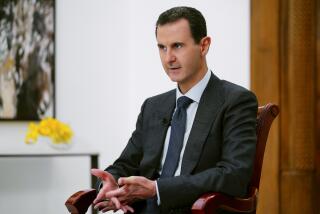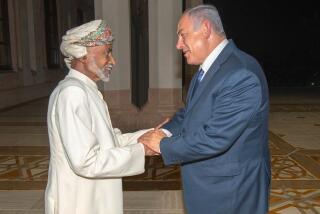Flying Iraq’s Relatively Friendly Skies
- Share via
BAGHDAD — In a land where criminals and insurgents control many roads, Iraq’s national airline hopes the skies will provide a means to unite the fractious country.
Iraqi Airways last month inaugurated service from Baghdad to two cities: Basra in the south and Irbil in the north. It vows that more cities will follow.
Transportation Minister Salam Maliki told the Iraqi National Assembly that Beirut, Cairo, Istanbul, Turkey, and Frankfurt, Germany, were among the destinations to be added to the airline’s scheduled flights from Baghdad’s international airport.
“When we started our flights, we moved a step closer to the world,” said Adil Hatam Hilou, an Iraqi Airways official.
Western airlines are also poised to enter the market.
British Airways plans to resume flights from London to Baghdad, and Lufthansa, Virgin Atlantic Airways and Northwest Airlines also have expressed interest in operating flights here, officials said.
“We hope that we can compete with other companies,” said Abd Ali, director-general of Iraqi Airways, who wants to revive the carrier once known throughout the Middle East for its service and modern fleet.
On a recent afternoon, Hussin Nimma, a passenger waiting at the Baghdad airport, echoed Ali’s hopes.
“I hope it’ll return to its previous glory,” he said of the airline. “The planes are old and the service is medium, but it’s a dream come true to have planes flying again.”
Nimma, a well-known singer, lounged on a sofa in the main terminal, sporting bluejeans, yellow-tinted glasses and a tan. Three girls wearing pink head scarves ogled the crooner, famous for his melancholic tunes, as armed contractors walked by.
“Nowadays, transportation inside Iraq is difficult, especially because of the Islamic fundamentalists,” said Nimma, who was headed to Damascus. The Syrian capital is one of the airline’s two international destinations; the other is Amman, Jordan.
But even flying above this troubled land has its challenges.
Frequent sandstorms and the unstable security situation routinely close down the airport, making flights highly irregular.
A contract dispute between the British security company that patrols the airport and the Iraqi Transportation Ministry led to a 48-hour shutdown last month. And the U.S. State Department’s latest travel warning for Iraq cautions that there is “credible information that terrorists are targeting civil aviation.”
The statement warns that “civilian and military aircraft arriving in and departing from Baghdad International Airport have been subjected to small arms and missiles.”
Coalition aircraft have been brought down by ground fire on several occasions across Iraq. In 2003, a DHL cargo plane made an emergency landing at the Baghdad airport after a rocket set its wing ablaze.
To avoid rocket-propelled grenades or other artillery fired by insurgents, pilots ascend and descend in tight corkscrews.
The road to the airport is also hazardous, frequently hit with mortar rounds and targeted by suicide bombers. Last month, a suicide car bomber detonated his explosives at the main airport checkpoint, wounding three Iraqi Airways employees on their way to work.
Still, flying is preferable to driving, said Jabbar Leaby, director of the state-run South Oil Co.
“It’s more convenient and it’s safer,” he said. Besides, he added, the existence of flights is “a signal that things are improving.”
He was one of a dozen passengers waiting at the airport recently for a flight to Basra that had been delayed. Other passengers included businessmen and a delegation from the Human Rights Ministry.
The only women aboard were flight attendants. Wearing mint-green uniforms and matching eye shadow, they offered bits of pound cake and soda.
Seats were mostly empty, with airline staff outnumbering passengers 2 to 1.
As the 20-year-old Boeing 727 began its descent to Basra’s airport, a red sandstorm raged outside the windows. The plane groaned and creaked as it hit the tarmac.
The flight was decidedly low-budget. There were no magazines or even emergency instructions in the seat pockets.
Both domestic and international tickets are heavily subsidized. At $750, the price of a round-trip flight between Baghdad and Amman is $350 less than that of its only competitor on the route, Royal Jordanian Airlines.
One-way tickets to Basra and Irbil cost $50 and $75, respectively -- still prohibitively expensive for most Iraqis. The airline plans to cut prices to bring more Iraqis on board, Ali said, declining to give specifics.
Flights have been mostly empty, carrying no more than 35 passengers in the 137-seat cabin, said Hilou, an assistant manager in the airline’s Basra office.
Ali acknowledged that business so far had been lackluster.
“We are making money, but not much,” said Ali, who would like to advertise but doesn’t have the money for a national TV campaign.
The airline’s trouble began in the run-up to the 1991 Persian Gulf War, when most of the fleet was flown to Iran, Jordan and Tunisia so it could be out of harm’s way. Sanctions imposed after the war grounded those planes, and many have deteriorated while a compensation case brought by Kuwait against Iraq has been making its way through court, Ali said.
In 2001, the airline began limited domestic service, using seven remaining planes. But the U.S.-led invasion in 2003 put an end to that. Troops bombed the Baghdad airport, damaging a terminal and several landing strips.
At Basra’s airport, which officials hope may become another international hub, air conditioning is among the main problems.
The U.S. Army Corps of Engineers hopes to fix that as part of a $40-million renovation. The British military, which occupies part of the airport, is expected to hand over the facility by the end of the year. International flights are supposed to begin within six months.
On a recent afternoon there, a dozen passengers waited in the virtually empty departure hall, where the temperature was about 120 degrees. Their flight to Baghdad was three hours late.
Surrounded by aides wearing suits and carrying attache cases, Maliki, the transportation minister, was waiting for the same flight.
A few weeks earlier, sheep had been slaughtered on the tarmac outside to celebrate Maliki’s arrival on the maiden flight from Baghdad. Now, hot and hungry passengers advanced on the minister, voicing their complaints about the delay.
There was no flight in sight.
Followed by a phalanx of his assistants, the minister beat a hasty retreat to the airport’s air raid shelter.
More to Read
Sign up for Essential California
The most important California stories and recommendations in your inbox every morning.
You may occasionally receive promotional content from the Los Angeles Times.










